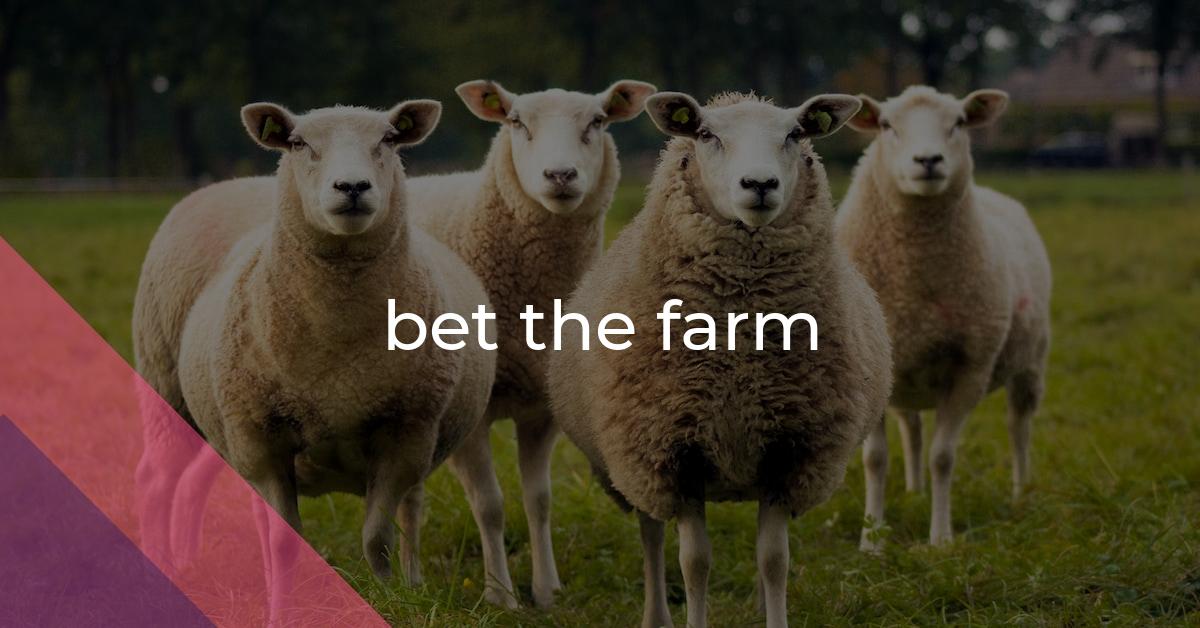bet the farm: Idiom Meaning and Origin
What does ‘bet the farm’ mean?
The idiom bet the farm means to risk everything, including one's financial stability or well-being, on a particular endeavor or outcome.

Idiom Explorer
The idiom "lay on the line" means to take a risk or be open and honest about something, often exposing oneself to potential danger, criticism, or negative consequences.
The idiom "in for a dime, in for a dollar" means that once you commit to something, you are fully committed and have to see it through to the end, regardless of the consequences or risks involved.
The idiom "high-stakes" refers to a situation in which there is a significant potential gain or loss, usually involving a lot of money or important consequences.
The idiom "hang one's hat" means to settle down or establish oneself in a particular place or situation.
The idiom "go to the wall" means to face defeat or failure, often in a financial or competitive context.
The idiom "go out on a limb" means to take a risk or to put oneself in a vulnerable position by expressing an opinion or taking an action that is not widely supported or accepted.
The idiom "go for broke" means to take a great risk or make a bold, all-out effort in pursuit of a goal, regardless of the potential consequences or failure.
The idiom "go far" means to achieve great success or make significant progress in one's endeavors or career.
High-Stakes Gamble
The idiom "bet the ranch" is closely related to the idiom "bet the farm". Both idioms convey the idea of taking a significant risk or wagering something valuable on a particular outcome or event. While "bet the ranch" is often used synonymously with "bet the farm", it specifically refers to risking one's entire wealth or financial security, often in pursuit of a high reward or success.
Similarly, the idiom "bet one's boots" is another variation of "bet the farm". This expression originated in the western United States and is rooted in the image of a cowboy placing a bet on a game or competition with great certainty and confidence. By wagering one's boots, a cowboy is symbolically staking something essential to their livelihood, as boots were vital for navigating the rugged terrain and working on ranches. Thus, "bet one's boots" carries the same connotation of taking a noteworthy gamble or showing unwavering belief in a particular outcome.
Another related idiom is "bet one's bottom dollar". This phrase conveys the idea of wagering one's last dollar or the entirety of one's financial resources on a specific event or outcome. "Bottom dollar" refers to the last dollar in one's possession, often associated with minimal financial security. By "betting one's bottom dollar", individuals are emphasizing their strong conviction or certainty in the desired result, similar to the level of risk conveyed by "bet the farm".
The idiom "buy the farm" also shares similarities with "bet the farm". While originally an expression related to farming, it evolved to encompass a broader meaning of taking a significant risk or suffering a great loss. The phrase "buy the farm" is believed to have originated during World War II when a pilot's death in combat would result in financial compensation for their family, enough to pay off the mortgage on their farmland. Thus, "buy the farm" evolved to signify the ultimate sacrifice or loss, extending beyond its agricultural origins to encompass any situation involving a substantial risk.
These related idioms, including "bet the ranch", "bet one's boots", "bet one's bottom dollar", and "buy the farm", underscore the concept of taking a significant gamble or demonstrating a high level of confidence and certainty in a particular outcome. Each of these phrases conveys the magnitude of risk or commitment associated with the idiom "bet the farm", whether in the literal or metaphorical sense.
Example usage
Examples of how the idiom *bet the farm* can be used in a sentence:
- He decided to bet the farm and invest all his savings in the new startup.
- She knew the risks, but she still decided to bet the farm and buy the expensive house.
- They're really confident in their new product, so they are willing to bet the farm on its success.
More "Risks" idioms



